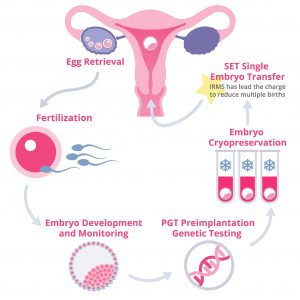
IVF surrogacy is an advanced reproductive technology that combines in vitro fertilization (IVF) with the assistance of a gestational surrogate mother to carry and deliver a child for an intended parent or parents. IVF surrogacy is often considered when individuals or couples cannot carry a pregnancy themselves due to medical reasons or other factors. This may include women with infertility issues, reproductive disorders, or those who are unable to carry a pregnancy due to health concerns or absence of a uterus.
In IVF surrogacy, embryos are created through IVF, using either the intended mother’s eggs or a donor egg, and sperm from the intended father or a sperm donor. The embryos are then implanted in the uterus of a gestational surrogate, who will carry the pregnancy and deliver the baby. The surrogate has no genetic link to the child as the embryo is not derived from her eggs, distinguishing IVF surrogacy from traditional surrogacy, where the surrogate may also contribute her eggs.
Surrogacy has become a valuable option for same-sex couples, single individuals, and couples experiencing infertility. The rise of reproductive technology and evolving legal frameworks have made surrogacy a feasible and highly effective solution for many.
IVF surrogacy is often pursued due to a variety of medical and personal factors. These include physical health, fertility issues, age, and other complications that may prevent a woman from carrying a pregnancy. Some common causes and risk factors include:
1. Female Infertility:
-
Ovarian Insufficiency or Failure: Women with diminished ovarian reserve or early menopause may not produce viable eggs for fertilization, making IVF surrogacy an ideal solution.
-
Health Conditions: Conditions such as endometriosis, PCOS (Polycystic Ovary Syndrome), fibroids, or cervical issues may hinder a woman’s ability to carry a pregnancy.
-
Repeated Pregnancy Loss: Women who have experienced multiple miscarriages may choose surrogacy as a way to carry a genetically related child to term.
2. Absence of Uterus:
-
Women who do not have a uterus due to congenital issues, hysterectomy (surgical removal of the uterus), or certain medical conditions, may need to opt for surrogacy to become parents.
3. Advanced Maternal Age:
-
Women over the age of 35 often experience reduced egg quality and fertility issues. In some cases, a woman may decide to use a donor egg and a surrogate to carry the child, particularly if IVF with their own eggs has failed.
4. Same-Sex Couples:
-
Same-sex male couples often use IVF surrogacy with an egg donor and a gestational surrogate to build their families. Surrogacy allows them to have a biological child with a donor egg and the sperm of one or both partners.
5. Medical Conditions Affecting Pregnancy:
-
Some women have medical conditions that make pregnancy dangerous, such as heart disease, diabetes, high blood pressure, or autoimmune diseases. In these cases, IVF surrogacy offers a safer route to parenthood.
6. Unexplained Infertility:
-
Couples who have unexplained infertility, where no identifiable cause is found after testing, may opt for IVF surrogacy after repeated IVF failures with the intended mother’s eggs.
IVF surrogacy itself does not present symptoms, as it is a procedure involving the transfer of embryos to the surrogate mother’s uterus. However, there are certain signs and symptoms associated with the IVF and surrogacy process that both the intended parents and the surrogate may experience.
1. For the Intended Mother:
-
Hormonal Treatment Symptoms: The intended mother may undergo hormonal treatment (e.g., ovarian stimulation for egg retrieval, and progesterone to support embryo implantation). Symptoms may include mood swings, headaches, nausea, and bloating.
-
Egg Retrieval: Following the egg retrieval process, the intended mother may experience mild discomfort, bloating, and light bleeding.
2. For the Surrogate Mother:
-
Embryo Transfer Symptoms: After the embryo transfer, the surrogate may experience mild cramping, spotting, or breast tenderness as a result of the hormonal treatments.
-
Pregnancy Symptoms: If the embryo transfer is successful, the surrogate may begin to experience typical early pregnancy symptoms, such as fatigue, morning sickness, breast tenderness, and increased urination.
3. General IVF Symptoms (For Both Parties):
-
Emotional Impact: Both intended parents and the surrogate may experience stress, anxiety, or emotional fatigue during the process, which can affect their physical well-being.
-
Ovarian Hyperstimulation Syndrome (OHSS): In rare cases, the egg donor or surrogate may experience OHSS as a result of ovarian stimulation, leading to symptoms like bloating, nausea, and pain.
The diagnosis and preparation for IVF surrogacy involve several steps for both the intended parents and the surrogate. These steps ensure that the process is medically sound and legally compliant.
1. Fertility Evaluation for the Intended Mother:
-
Ovarian Reserve Testing: Blood tests (such as AMH and FSH) and ultrasound imaging of the ovaries help determine the egg quality and fertility potential of the intended mother.
-
Uterine Health Assessment: Ultrasound and hysteroscopy may be performed to ensure the uterus is suitable for embryo implantation, checking for fibroids, polyps, or structural abnormalities.
2. Fertility Evaluation for the Surrogate:
-
Psychological Evaluation: Surrogates undergo psychological assessments to ensure they are mentally prepared for the emotional challenges of surrogacy.
-
Medical Screening: The surrogate will be tested for STDs, genetic disorders, and overall health to ensure she is physically capable of carrying a pregnancy.
-
Uterine Health: An ultrasound and hysteroscopy ensure that the surrogate’s uterus is healthy and can support a pregnancy.
3. Legal and Psychological Screening:
-
Both the surrogate and the intended parents will need to undergo legal counseling to ensure all parties understand their rights, responsibilities, and obligations. Contracts are drawn up to clarify the legal aspects of the surrogacy, including parental rights and financial arrangements.
-
Genetic Testing: If egg donation is involved, the donor may undergo genetic testing to screen for inherited conditions, ensuring that only healthy embryos are transferred.
The primary treatment for IVF surrogacy involves several key stages. These stages combine IVF procedures with the assistance of a surrogate to carry the pregnancy to term.
1. Ovarian Stimulation and Egg Retrieval:
-
The intended mother may undergo ovarian stimulation to produce multiple eggs, which are then retrieved in a minor surgical procedure. Alternatively, egg donation may be used if the intended mother is unable to provide viable eggs.
2. Fertilization and Embryo Culture:
-
The eggs are fertilized using sperm from the intended father or a sperm donor. The fertilized eggs (embryos) are cultured for a few days, monitored for development, and selected for transfer.
3. Embryo Transfer to the Surrogate:
-
The best-quality embryos are selected and transferred to the surrogate’s uterus. This is done via a simple, non-surgical procedure under ultrasound guidance.
4. Pregnancy Monitoring:
-
After the embryo transfer, the surrogate undergoes blood tests to confirm pregnancy (via hCG levels) and regular ultrasounds to ensure the pregnancy is progressing well.
While IVF surrogacy itself cannot prevent infertility, there are several steps that intended parents and surrogates can take to increase the chances of a successful pregnancy.
1. Healthy Lifestyle:
-
Balanced Diet: Maintaining a healthy diet rich in essential nutrients is key for both the surrogate and intended mother to ensure egg quality and a healthy pregnancy.
-
Exercise: Light exercise may be recommended to improve overall health, but it’s important to avoid overexertion.
-
Smoking, Alcohol, and Caffeine: Both intended parents and surrogates are encouraged to avoid smoking, drinking alcohol, and consuming excess caffeine, as these can affect fertility and pregnancy.
2. Emotional Support and Counseling:
-
Both the intended parents and surrogates may benefit from psychological counseling to help them manage the emotional and mental challenges of IVF surrogacy.
-
Support groups for surrogates can offer a sense of community and understanding throughout the process.
3. Regular Monitoring and Follow-ups:
-
Regular monitoring of hormone levels, ultrasound imaging, and health checkups are crucial for tracking the progress of the pregnancy and ensuring that the surrogate and embryo are healthy.
While IVF surrogacy has a high success rate, there are potential risks and complications that can arise during the process.
1. Ovarian Hyperstimulation Syndrome (OHSS):
-
OHSS can occur when the ovaries are overly stimulated, causing them to swell and release fluid into the abdomen. This condition requires careful monitoring to avoid severe complications.
2. Multiple Pregnancies:
-
IVF surrogacy can result in multiple pregnancies (twins, triplets), which carry higher risks such as preterm birth, low birth weight, and preeclampsia.
3. Ectopic Pregnancy:
-
Though rare, there is a risk of an ectopic pregnancy, where the embryo implants outside the uterus, usually in the fallopian tube.
4. Emotional and Psychological Effects:
-
Surrogates and intended parents may experience emotional and psychological challenges, such as stress, anxiety, or postpartum depression. Support systems and counseling can help manage these concerns.
The decision to pursue IVF surrogacy often requires careful thought and preparation. It involves not just medical and financial considerations but also emotional resilience.
1. Emotional Resilience and Counseling:
-
Both intended parents and surrogates may face emotional challenges. For intended parents, the uncertainty of IVF surrogacy can be daunting, while surrogates may experience emotional connections to the pregnancy and the child. Professional counseling can help manage these emotions.
2. Long-Term Relationship with the Surrogate:
-
Many surrogacy agreements involve maintaining an ongoing relationship between the intended parents and the surrogate, ensuring both parties are emotionally and legally supported.
3. After the Baby’s Birth:
-
Once the baby is born, the legal process of transferring parental rights to the intended parents occurs. This may involve legal contracts and adoption procedures, depending on the jurisdiction.
1. What is IVF surrogacy?
IVF surrogacy is a reproductive process where a woman (the surrogate) carries and delivers a child for another person or couple (the intended parents) using in vitro fertilization (IVF). The embryo, created through IVF using the intended mother's or a donor's eggs and the intended father's or a donor's sperm, is implanted into the surrogate's uterus for pregnancy.
2. Why would someone consider IVF surrogacy?
IVF surrogacy is often considered when:
-
The intended mother is unable to carry a pregnancy due to medical conditions, such as uterine abnormalities, medical complications like heart disease, or repeated pregnancy loss.
-
Same-sex couples or single men who want to have a biological child.
-
Women with health conditions that make pregnancy dangerous or impossible.
-
Failed fertility treatments where traditional IVF has been unsuccessful.
3. How does IVF surrogacy work?
The process of IVF surrogacy involves several steps:
-
Ovarian Stimulation: The intended mother (or egg donor) undergoes ovarian stimulation to produce multiple eggs.
-
Egg Retrieval: The eggs are retrieved and fertilized with sperm in the laboratory via IVF or ICSI.
-
Embryo Culture: The fertilized eggs are cultured to form embryos.
-
Embryo Transfer: The healthiest embryo(s) are selected and transferred into the surrogate’s uterus.
-
Pregnancy Test: After about 10-14 days, a pregnancy test is done to check if the transfer was successful.
4. What is the difference between traditional surrogacy and IVF surrogacy?
Answer:
-
Traditional surrogacy involves the surrogate using her own eggs, meaning she is both the genetic and gestational mother of the child.
-
IVF surrogacy involves the use of eggs and sperm from the intended parents or donors, with the surrogate only carrying the pregnancy. In this case, the surrogate has no genetic link to the child.
5. Who is a suitable candidate for IVF surrogacy?
Ideal candidates for IVF surrogacy are:
-
Women who cannot carry a pregnancy due to health conditions, such as uterine abnormalities or previous complications in pregnancy.
-
Same-sex couples who want to have a biological child.
-
Women with a history of recurrent pregnancy loss or failed IVF cycles.
-
Women who have had their uterus removed or have certain health conditions that make carrying a pregnancy unsafe.
6. What are the legal implications of IVF surrogacy?
Legal aspects of IVF surrogacy can vary by country and jurisdiction. In most cases, the intended parents are the legal parents of the child born through surrogacy, but it is important to have a legal agreement in place. This agreement typically covers issues such as parental rights, compensation for the surrogate, and the rights of the surrogate to make decisions regarding her health and pregnancy. Legal counsel is highly recommended for all parties involved to ensure clarity and protection.
7. What is the success rate of IVF surrogacy?
The success rate of IVF surrogacy depends on various factors such as the quality of the embryos, the health and age of the egg provider (if using a donor), and the health of the surrogate. On average, the success rate for IVF surrogacy is around 50-70% per cycle. However, these rates can vary by clinic and are influenced by factors such as the quality of the embryos and the surrogate's health.
8. What are the risks involved in IVF surrogacy?
While IVF surrogacy is generally safe, it does carry some risks, including:
-
Ovarian hyperstimulation syndrome (OHSS) due to the hormonal stimulation of the egg donor.
-
Complications related to the pregnancy: As with any pregnancy, surrogates face risks such as preterm labor, gestational diabetes, or high blood pressure.
-
Emotional and psychological challenges: Both surrogates and intended parents may face emotional stress due to the complex nature of surrogacy.
-
Multiple pregnancies: If more than one embryo is transferred, there is an increased risk of twins or triplets, which can lead to complications.
9. How much does IVF surrogacy cost?
The cost of IVF surrogacy can vary widely depending on the fertility clinic, country, and additional services involved. On average, the cost can range from $60,000 to $150,000 or more per cycle. This cost typically includes medical expenses, surrogate compensation, legal fees, and agency fees. Insurance coverage for IVF surrogacy varies, and it’s essential to check with providers to understand what is covered.
10. Can intended parents use a gestational carrier if they are unable to conceive?
Yes, intended parents who are unable to conceive can use a gestational carrier (also known as a surrogate) to carry the pregnancy. This option is particularly helpful for couples or individuals who are unable to conceive naturally or carry a pregnancy due to medical or health issues. The carrier has no genetic link to the child and carries the embryo created through IVF, typically using the intended mother's or a donor’s eggs and sperm from the intended father or a donor.
The other Infertility Treatment Procedures are:
- Intra Cytoplasmic Sperm Injection (ICSI)
- Testicular Sperm Aspiration (TESA)
- Surgical sperm retrival ...etc
Few Major Hospitals for IVF are:
- Jinemed Hospital
- Jindal Heart Institute & Test Tube Baby Centre
- Apollo Fertility and IVF Center
- Jaslok Hospital and Research Centre
- Shivam Fertility & IVF Centre
- Lilavati Assisted Conception Unit
Thailand, Malaysia, Singapore, Turkey and India are the most cost effective locations that offer up to almost 80% savings in comparison to the US.
SurgeryPlanet facilitates a plethora of services to the medical treatment traveler also which includes, a hassle free and discounted travel option, a welcome hand at the airport on arrival, travel in an air-conditioned car, round the clock service & support. Your medical evaluation is pre arranged with the least of waiting time. Once your assessment is complete and found medically fit, the procedure is immediately scheduled without a waiting period. Please read through our Services and Testimonials to understand and select your best options.
Major Treatments Abroad: Obesity / Bariatric Surgery | Spine Surgery | Stem Cell therapy | Fertility treatment | Knee replacement in India and Thailand | Heart Surgery | Organ transplant | Ayurveda Treatment | Heart valve replacement | Hip resurfacing | Hospitals in India and Thailand for Laparoscopic Sterilization| Best hospitals in Asia | JCI & ISO certified Hospitals | Cost effective medical procedures | Healthcare tourism | Complete privacy for affordable cost | Weight loss procedures | Infertility treatment | Board certified physicians | Low cost surgeries
SurgeryPlanet is an Healthcare Facilitator and not a Medical service provider. The information provided in this website is not to be used for diagnosis or treatment of any medical condition or use for any medical purposes. We provide information solely for medical travel facilitation and do not endorse any particular health care provider, hospital, facility, destination or any healthcare service or treatment listed. We are not an agent for, or affiliated to any health care provider, or service listed in our website and is not responsible for health care services provided by them. Choice of hospital or doctor for your healthcare services is your independent decision. Consult your domestic licensed health care provider before seeking the services of any health care provider you learn about from our website.



